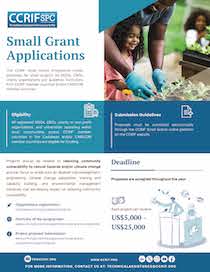Grand Cayman, 1 July 2010 – All sixteen members of the Caribbean Catastrophe Risk Insurance Facility (CCRIF) have renewed their policies for hurricane and earthquake coverage for the 2010/11 year beginning on 1 June – the start of the hurricane season. The National Oceanic and Atmospheric Administration forecast estimates an 85% chance of an above normal hurricane season this year. This could have serious implications for Caribbean islands and potential losses, especially given the poor economic conditions still affecting the region. This therefore makes the need for CCRIF even stronger.
For 2010/2011, policy pricing was again reduced as part of CCRIF’s planned strategy to minimise premium costs to its participating countries. Another change to the new policies is that they are now based on CCRIF’s second generation model which represents the levels of hurricane and earthquake risks faced in the Caribbean region at higher resolution than the initial model. For example, the hurricane model now explicitly includes losses due to storm surge. Completion of the new modelling platform will also enable CCRIF to more easily develop and implement additional products beyond hurricane and earthquake coverage, for example the excess rainfall product, which is expected to be available by year-end.
These two factors contributed to some changes in coverage characteristics selected by governments and also led to a general increase in coverage limits for the 2010/11 policies. Most countries maintained premiums at the same level as last year. As a result of increased appreciation of seismic risk following the Haiti earthquake in January, twelve countries increased their coverage limit for earthquakes.
In recognition of the exceptional fiscal challenges which the region continues to face this year due to the global economic crisis, CCRIF explored a number of channels to ease the premium burden on participants. This included internal mechanisms as well as engagement with the donor community. A number of countries were able to take advantage of these channels, and CCRIF will continue to pursue opportunities for providing assistance and attracting funding to build disaster resilience within its member governments and the broader Caribbean region.
Recognising that current policies provide a cost-effective solution for just one part of the larger comprehensive disaster management process, CCRIF continues to develop partnerships throughout the region and around the world to assist in better understanding and implementing a broad range of disaster risk management tools to support sustainable development in the face of growing natural catastrophe risk.
About CCRIF: CCRIF is a risk pooling facility, owned, operated and registered in the Caribbean for Caribbean governments. It is designed to limit the financial impact of catastrophic hurricanes and earthquakes to Caribbean governments by quickly providing short term liquidity when a policy is triggered. It is the world’s first and, to date, only regional fund utilising parametric insurance, giving Caribbean governments the unique opportunity to purchase earthquake and hurricane catastrophe coverage with lowest-possible pricing. CCRIF represents a paradigm shift in the way governments treat risk, with Caribbean governments leading the way in pre-disaster planning. CCRIF was developed through funding from the Japanese Government, and was capitalised through contributions to a multi-donor Trust Fund by the Government of Canada, the European Union, the World Bank, the governments of the UK and France, the Caribbean Development Bank and the governments of Ireland and Bermuda, as well as through membership fees paid by participating governments.
Sixteen governments are currently members of CCRIF: Anguilla, Antigua & Barbuda, Bahamas, Barbados, Belize, Bermuda, Cayman Islands, Dominica, Grenada, Haiti, Jamaica, St. Kitts & Nevis, St. Lucia, St. Vincent & the Grenadines, Trinidad & Tobago and the Turks & Caicos Islands.
Press contact: Elizabeth Emanuel/Gina Sanguinetti Phillips, pr@ccrif.org.





